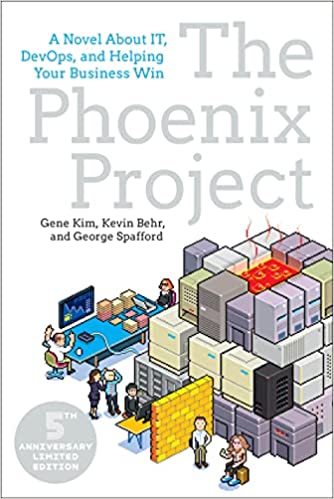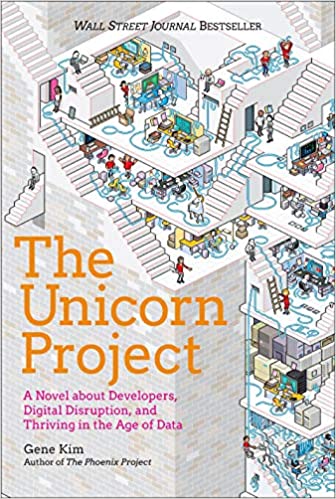Photo by Torsten Dederichs on Unsplash
As I write this post, I am reminded of a classic novel – A Tale of Two Cities, with the story happening in Paris and London around the time of the French revolution. The story events reflect the prevalent culture – good and bad – in Paris and London. If you have read the book, which do you think was the better place for humanity then? Paris or London? If you ask me, I would say Paris started out to be the better place early in the book but eventually lost out to London as the murder and mayhem of the revolution overwhelmed the city…
Anyway, let’s get to the point – my own tale of two books: The Phoenix Project and The Unicorn Project.
The authors: Gene Kim, Kevin Behr and George Spafford – all eminent folks from the industry with rich backgrounds and experience in DevOps and DevSecOps.
Let me first say that both these books are excellent and highly successful in sales and critically acclaimed. Even though they are business novels, they are real page turners – like suspense thrillers almost. So, why compare them? Well, because they are books on the same subject (IT and DevOps) and from the same author(s) and read by the same person, me. By sharing my notes on the comparison, I am also enticing you – not very subtly – to read them both, if you have not already! Even if you have read one or both, do consider my points of comparison below.
Here are they are:
1. Sequel or not?
The success of the first book, The Phoenix project (2013) undoubtedly spurred the second book The Unicorn Project (2019). The authors say it is not a sequel. While the fictional company (Parts Unlimited) and many characters are borrowed from the first book, there is really no need to read the first before the second. But I do think it is nice to read them in sequence with some time interval, like I did. Doing so makes one to contemplate on the first book for a while and then get ready for the second – gives one a sense going back to an old haunt and visiting buddies from the past!
2. Differences in themes
The key theme of the Phoenix Project book is the applicability of lean manufacturing concepts to the IT & software world. This theme is nicely developed in stages with Erik Reid (Board Member of Parts Unlimited) acting as coach for Bill Palmer (VP, IT Operations). Erik helps Bill in the discovery and adoption of lean practices in the organization. If you study what Erik has to say, whatever doubts you may have had about lean in the software would vanish and you will likely become a lean champion. The theme of the Unicorn Project, on the other hand, is more around build process effectiveness and developer productivity – reducing wait states, waste, dependencies etc.
3. Changes in context and narration
Like I said before, many contextual elements are carried over from the first book to the second. The board room tussles, turf battles across functions, agenda-driven leaders etc. are all there in good measure. However, a surprise change in context is that the Phoenix Project, the darling initiative of the first book, has somehow turned out to be a failure at the start of the second book, for reasons unexplained.
Many of the original rich characters continue with new ones. The new protagonist in the second book is Maxine Chambers (Developer Lead / Architect) replacing Bill Palmer in the first book. The narration in the Phoenix Project is in the first-person (by Bill Palmer) which I very much like; it is in the third-person in the later book which is ok but somehow not as “alive”.
4. Reading experience
I am a die-hard fan of physical books and not so much of a Kindle reader. So, I had gotten a hard copy of the Phoenix Project way back but ended up buying the Kindle edition of the Unicorn Project (a lot cheaper!). In both cases, I finished reading in a couple of days – page turners indeed. I grudgingly admit that the Kindle edition made it so much easier to take notes, highlight etc. and export them to a html document as well. Here are a few sample snippets from my notes on the Unicorn book:
- On collaboration: “Maybe it’s because when friends do favors for friends , we don’t require them to open a ticket first”
- On Product Requirements Document (PRD): “The PRD! Everyone shouts, laughing. Maxine raises her eyebrows. PRDs made sense decades ago, when you wanted written justification before you wasted a bunch of developers’ time. But now you can prototype most features in the time it takes to even write one page of a PRD. One team can now build things that used to require hundreds of people”
- A term for those hard to reproduce defects: “Heisenbugs!”
- Sensei Edwards Deming: “a bad system will beat a good person every time”
- Satya Nadella: “Microsoft has the culture that if a developer ever has a choice between working on a feature or developer productivity, they should always choose developer productivity”
- The tragic story of Nokia: “They (Nokia leaders) lacked the conviction to rebuild the foundations of their (Symbian-based) software systems”
And lastly, my favorite: “Even unicorns are essentially horses and even horses can do unicorn-like things!”
Ok, hope you liked the snippets. Moving on, even with the best of books, nitpickers like me will have our peeves. Here are a couple:
- In the Unicorn Project book, the author, among other things, seeks to provide a refresh of the tech context for the tale; after all a great deal happened technology-wise in the period between the two books, 2013 and 2019. I feel this refresh is a bit overdone with lots of tech stuff thrown around – like functional programming, Hadoop Spark etc. – may go over the head of the lay reader
- I missed the active presence of the coach & lean evangelist Erik Reid in the second book, a quirky character pretty central to the first book but shifted to a more background role in the second; however, he does do the crucial job of planting important notions in the minds of Maxine and others, like Lean Ideals, Business Horizons etc. (look them up!)
So, at the end of the day, which book is “London” and which book is “Paris” and which is better? Personally, I would say The Phoenix Project is the better one (London?), mainly because I gained much in terms of knowledge about lean concepts, told in such a practical and engaging manner. That said, I will not throw spoilers for your reading experience! Do read both the books and form your own opinions.
Oh, by the way, I am just an independent reader and do not benefit in any way from the sale of the two books (I wish!).
Just one more thing. If you would like to try your hand at a Lean Agile quiz, here is one! Have fun!!



